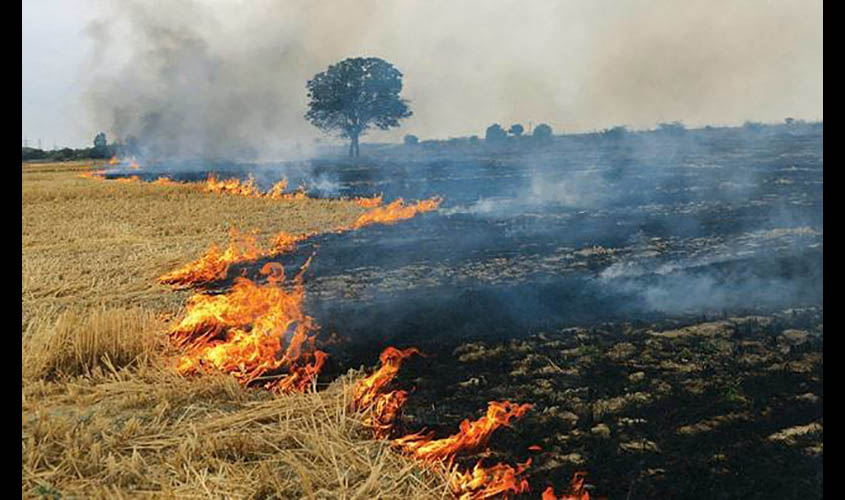Northern India, including Delhi, is facing the prospect of becoming one of the most polluted places on earth.
Northern India—including Delhi, the national capital of an aspiring global power, a wannabe Vishwaguru (whatever it means), one of the largest economies of the world—is once again facing a dreadful prospect: of becoming one of the most polluted places on earth. And no, there is no “foreign hand” behind it, no conspiracy to torment Indians, no enemy action; there is sheer incompetence and apathy of Himalayan proportions on the part of the political class, the class that has shed even the pretences of morality. Also, there is the questionable conduct of farmers.
“In the next few days, India’s northern region, especially Delhi, is again likely to become among the most polluted places on earth because a vast number of farmers in Punjab and Haryana have decided to continue their annual ritual of setting fire to paddy straw,” the Times Of India reported on 5 October. “This has brought back the spectre of smog choking the region despite the Centre doling out more than Rs 1,000 crore to the two states to fight stubble-burning, and Punjab and Haryana mobilizing almost their entire bureaucracy to fight the menace.”
As feared, crop burning began a few days later, even as the canting politicians mouthed gibberish and platitudes, experts pontificated, and the media reported the rising cases of stubble burning. The reasons are simple: profit margins in the farm sector are very low, and the alternatives to crop burning are expensive which erode the margins. Now, farmers are generally regarded as holy cows in India’s political debate, public discourse, and folklore. So, the authorities are loath to penalise them. Even when the penalties are imposed, these are light.
Further, in the northern states, paddy straw is burnt in the fields by farmers after harvesting during October-November because the time lag between harvesting of the paddy and sowing of wheat is just three weeks. Burning is found expedient.
At the heart of the problem is fact that agriculture is doing very badly. Despite about half the country’s working population engaged in it, its contribution to the gross domestic product or GDP is less than 15%. What the sector needs is structural change by way of opening up the sector, phasing out government controls, and allowing farmers to do whatever they want to do for higher revenues. But the powers that be are unwilling to do that. This is worse than policy paralysis; this is thinking paralysis.
So, politicians of all hues and parties continue with the policies and practices that have plagued the farm sector in the first place. They keep making the same populist promises that have been found ruinous for agriculture, indeed the entire economy. Rajasthan Chief Minister Vasundhara Raje’s sop on agricultural electricity connection is a recent instant of such populism. The promise came hours before the Election Commission’s announcement about the upcoming Assembly elections in Rajasthan and four other states.
But all over the country, farmers already free or cheap power, subsidy on fertilizers, minimum support prices or MSPs, cheaper credit (and frequent loan waivers), exemption from paying income tax, and so on. And then there is boundless sanctimoniousness; every politician’s heart bleeds for farmers. It may appear that Indian farmers are living in the best of all worlds, but they are actually living in the worst of all possible worlds: shrinking margins in a highly controlled sector that politicians have little intention of liberalising.
Politicians are unthinking; unfortunately, the representatives of farmers are no better. For instance, the Bharatiya Kisan Union (BKU), which organised a stir recently that choked the national capital region, seldom talks about opening up the sector. It generally seeks more sops.
After a meeting with Union Minister of State for Agriculture, Gajendra Singh Shekhawat, BKU general secretary, Yudhvir Singh said that “the government is silent on our demand for loan waiver, saying that the states had to take a decision at their level. Also, it said that fixation of MSP based on ‘C2’ input factor as per the Swaminathan Commission’s recommendations will be done in future.”
Notice the insistence on esoteric mechanisms, on morally and economically reprehensible practices like loan waivers. If farmers are exempted to repay their loans, what moral authority the government and banks would to ask sweepers, plumbers, electricians, taxi drivers, and the now famed pakodawallahs to repay their debts? They too are working people, barely eking out an existence.
In a nutshell, crop burning is the most perceptible symptom of deep-rooted farm crisis. It cannot be dealt with subsidies worth a few thousand crores, committees to look into the matter, and other ad hoc measures. The need of the hour is comprehensive reforms in the sector, so that the farmer gets freedom to carry out his activities to earn higher revenues. Those who matter, however, are willing to grant him only one freedom: to burn stubble.

